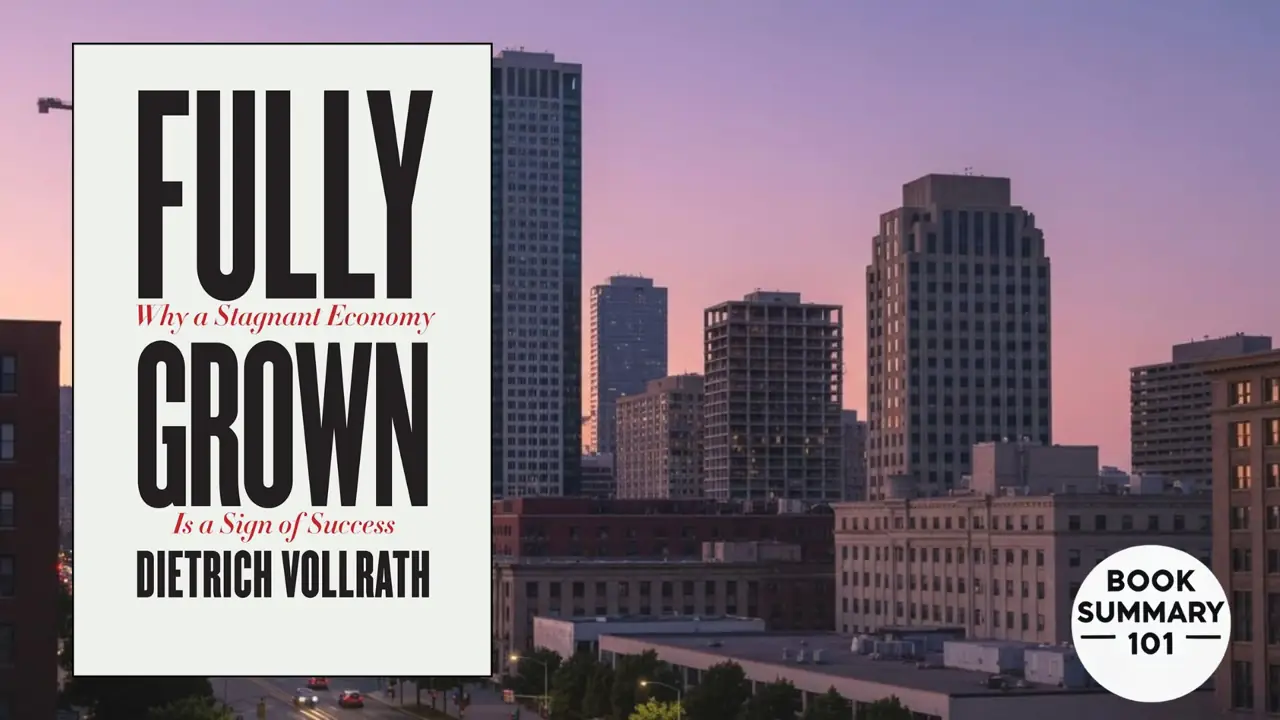If you’re like most people, hearing about a stagnant economy might make you feel uneasy. It sounds bad, right? After all, who doesn’t want growth, innovation, and bigger paychecks? But Dietrich Vollrath’s book Fully Grown: Why a Stagnant Economy Is a Sign of Success flips this idea on its head. He argues that slower economic growth in wealthy countries is not just inevitable—it’s actually a good thing. Intrigued? Let’s dive in.
Why Read This Book?
Here’s the deal: Most discussions about economic growth are either doom-and-gloom or loaded with jargon that puts you to sleep. Fully Grown is refreshingly different. Vollrath, an economics professor, makes a bold argument that our economy is slowing down because we’ve already achieved many of the things we were striving for.
He breaks down complex ideas in ways that are both clear and relatable, making this a must-read for anyone curious about what’s really happening with the economy—and why we don’t need to panic about it.
The Key Takeaway – Slow Growth = Success
Vollrath’s central thesis is this: Economic growth is slowing because we’re doing so well in key areas. Advances in health, education, and technology mean we’ve already solved many of the big challenges that drive rapid growth in developing economies.
Here’s the surprising twist: These achievements actually reduce the need for economic expansion. When people live longer, healthier lives and work fewer hours, the economy grows at a slower pace. But isn’t that what we’ve been working toward all along?
Why Slow Growth Reflects Progress
Let’s take a closer look at some real-world examples Vollrath explores in Fully Grown. These stories and trends show how our achievements in health, education, and technology have reshaped economic dynamics—and why that’s not a bad thing.
The “Fewer Babies” Effect
If you’ve been following global trends, you might have noticed that birth rates are declining in many developed nations. Countries like the United States, Japan, and much of Europe are seeing smaller family sizes. At first glance, this might seem alarming—fewer people mean fewer workers, which seems like a recipe for slower economic growth. But let’s dig into why this is happening and what it really means.
One major reason is the empowerment of women. In many parts of the world, women now have better access to education, careers, and reproductive health care. With these opportunities, women can make informed choices about when—and if—they want to have children. Instead of having large families out of economic necessity (as was common in the past), many couples are choosing to have fewer kids and invest more resources in each one.
Take Japan as an example. While the country is often cited as a cautionary tale of an aging population, it’s also a society where high education levels and career opportunities have transformed the role of women. Similarly, in the U.S., a rising number of women in the workforce has contributed to this shift. Fewer births might slow population growth, but it’s also a sign that families are more stable and focused on quality over quantity.
The Shift from Quantity to Quality
In developing economies, growth often comes from “catching up.” This means adding more workers to the economy, having people work longer hours, or producing more goods and services. But in wealthier countries, that approach doesn’t work anymore—mainly because it’s unnecessary. Instead, these nations shift their focus to improving productivity and quality of life.
Think about Sweden or Germany. These countries are known for their shorter workweeks and generous vacation policies. On paper, working fewer hours might seem like a productivity killer, but the opposite is often true. Workers with more downtime tend to be happier, healthier, and more efficient. They deliver high-quality work without burning out.
Take a look at Sweden’s six-hour workday experiments. By reducing work hours while maintaining pay, the country saw a boost in employee satisfaction and even increased output in some sectors. Sure, these policies might limit GDP growth since there are fewer hours worked overall, but they enhance what really matters: well-being, creativity, and sustainability.
This quality-over-quantity mindset also shows up in other areas, like education. Instead of just expanding access to schooling, wealthier nations invest in making education better—higher teacher pay, smaller class sizes, and updated curriculums. These improvements don’t always lead to rapid economic gains, but they create a society that values lifelong learning and innovation.
Technology Isn’t Magic—It’s Mature
Let’s rewind to the early 2000s. Remember when smartphones, social media, and e-commerce were blowing up? Those innovations didn’t just change how we live—they drove massive economic growth. But here’s the thing: groundbreaking technological revolutions don’t happen every decade.
As technologies mature, their transformative power naturally slows down. Think about your current smartphone. Sure, the camera is a bit sharper, and maybe it’s a tad faster than last year’s model. But these incremental upgrades don’t reshape entire industries like the original iPhone or the rise of broadband internet did.
This isn’t to say technology is stagnant—it’s just that its role has shifted. Instead of introducing brand-new industries, today’s tech focuses on refining what we already have. Consider cloud computing or artificial intelligence. These tools are more about improving efficiency than creating entirely new markets.
Take Amazon as an example. In its early years, it revolutionized how we shop, creating jobs and driving economic growth. Now, its focus is on optimizing its operations—like using robots in warehouses or streamlining delivery routes. These changes make the company more efficient, but they don’t have the same explosive impact on the economy as its initial innovations did.
This maturation of technology reflects a deeper truth: we’ve already reaped many of the biggest benefits from these advancements. While incremental progress is still valuable, it doesn’t drive growth at the breakneck pace we saw in the past—and that’s okay.
These examples highlight a bigger picture Vollrath wants us to see: slower economic growth isn’t a crisis. It’s the result of reaching a stage where we’ve solved many fundamental problems. We’re focusing on living better, not just producing more—and that’s a win for humanity.
What About Inequality and Climate Change?
Before you ask, no, Vollrath doesn’t ignore the challenges we still face. While celebrating progress, he acknowledges that wealth inequality and environmental issues remain significant problems. However, he separates these from the broader question of economic growth, showing how they require targeted solutions that don’t necessarily depend on GDP going through the roof.
Why This Book Stuck with Me
Reading Fully Grown was like a breath of fresh air. Vollrath doesn’t sugarcoat the complexities of economics, but he also doesn’t leave you feeling overwhelmed. Instead, he reframes slow growth as a sign that we’ve reached a point of abundance in many areas. For someone who’s always thought that “bigger is better,” this perspective was eye-opening.
Join the Conversation!
What do you think about the idea that slower economic growth could be a sign of success? Does it make you feel more optimistic—or does it raise more questions? Share your thoughts in the comments!
If you’ve read Fully Grown, I’d love to hear your takeaways. If not, let me know what you’d like to learn more about. Let’s dive into this fascinating topic together!
5 powerful quotes from Fully Grown by Dietrich Vollrath
📖 “Slower growth is not the result of failure; it is the consequence of success.”
This line captures the book’s central idea: advanced economies grow more slowly because they’ve already achieved so much in health, education, and technology.
Simple terms: The economy slows down because we’ve already made life better.
📖 “The transition from growth to maturity is the natural outcome of prosperity.”
Vollrath emphasizes that a slowdown doesn’t mean collapse—it means the economy has matured, much like a person reaching adulthood.
Simple terms: Slower growth just means the economy has grown up.
📖 “Demographics, productivity, and consumption choices—not crises—explain why growth has cooled.”
Instead of blaming recessions or politics, Vollrath shows that the slowdown comes from long-term trends like fewer births, better quality of life, and shifts in how we spend.
Simple terms: The slowdown is from lifestyle changes, not disasters.
📖 “A stagnant GDP doesn’t mean stagnant lives.”
Even if GDP growth is modest, people’s quality of life continues to improve through better health care, education, and more leisure time.
Simple terms: The economy may look flat, but life is still improving.
📖 “The success of modern economies is measured less by how fast they grow, and more by how well they sustain prosperity.”
Here, Vollrath flips the usual measure of success. Growth isn’t everything—sustaining stability and well-being matters more.
Simple terms: It’s not about getting bigger, it’s about keeping life good.



